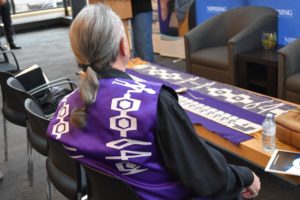Reconciliation starts in North Bay

By Kelly Anne Smith
NORTH BAY—The Truth and Reconciliation Commission gave 94 recommendations for Canada to attempt to mend the horrible history of Indian Residential Schools.
The 43rd Call to Action calls for federal, provincial, territorial, and municipal governments to fully implement the United Nations Declaration on the Rights of Indigenous Peoples to frame reconciliation. It has been stated that reconciliation includes the recognition of the rights of Indigenous peoples, enhancing harmonious and cooperative relations between the State and Indigenous peoples, based on principles of justice, democracy, and respect for human rights, non-discrimination, and good faith.
To progress globally for peace and prosperity, Reconciliation North Bay has formed under the Urban Aboriginal Strategy umbrella administered by the North Bay Indigenous Friendship Centre. Reconciliation North Bay launched as part of Treaty Week and the official opening of the RBC Treaty Learning Centre. It is now a Community Action Circle coordinated by Dawn Lamothe.
In her speech, Lamothe offered that the work of the Urban Aboriginal Strategy has been all about reconciliation from the start.
“We just didn’t call it that. Community Action Circle members have said to me ‘this is the first time I’ve been in the Indian Friendship Centre or this is the first time I heard this teaching or this is the first time I’ve smudged,” stated Lamothe. “When you are learning these things, and you are open, it’s pure openness. So many people tell me that they went home and shared with their families. They are so proud to share what they’ve learned.”
The Cultural Working Group will guide most of the strategy. Chair Rachel Norman says the establishment of Reconciliation North Bay is substantial for the city.
“The main principle we started with was to think global and act local. We want to bring reconciliation to life in our community,” stated Norman. “Who better to do that than everyone who resides in this community with everyone working together with mutual respect and equal opportunity?”
Nipissing University President Mike DeGagné will act as chair of Reconciliation North Bay. Previous to becoming Nipissing University President and Vice-Chancellor, Mike DeGagné was the executive director of the Aboriginal Healing Foundation, a national organization that addressed Canada’s Indian Residential School System.
DeGagné talked of the 20th anniversary of the Royal Commission on Aboriginal Peoples. It was to propose specific solutions “…to the problems which have plagued those relationships and which confront Aboriginal peoples today.” The Aboriginal Healing Foundation sprang from the commission.
“This was an attempt 20 years ago to begin a discussion on reconciliation,” noted DeGagné. “The Royal Commission went across Canada, met with communities, and came up with a very solid plan for reconciliation. To move forward we need to invest in all facets of the Aboriginal community. Then it sat on the shelf. Here, twenty years later, we are discussing the same issues.”
There is no blueprint said DeGagné.
“We are called to change the system,” continued DeGagné. “We need to talk about what we can do on a local level, reaching out to businesses and communities and boards and saying, ‘Join us in reconciliation. Examine the values of your institutions and maybe add reconciliation as a value.’ And we are trying to get people to commit to one act every year for Aboriginal Reconcilation Week.”
Other members in the Reconciliation North Bay Action Circle are Leo DeLoyde, Tanya Lukin-Linklater, and Ontario Human Rights Commissioner Maurice Switzer.
Urban Aboriginal Strategy Coordinator Dawn Lamothe was excited seeing the banner with the logo the youth had designed for Reconciliation North Bay.
“It is so positive that Dakota helped to design the banner through the Youth Action Circle,” stated Lamothe. “Then he spoke of the importance of the urban and the reserve experience coming together and that we all have to find a space to explore what reconciliation looks like in North Bay. The logo represents coming together.”
Speaking to the future of reconciliation, Nipissing University student Dakota Heon from Lac Seul First Nation or Obishikokaang on Kejick Bay first talked about a road block to reconciliation.
“There needs to be work from non-Indigenous people. One thing that hinders reconciliation from truly happening is the harm that has been done to our environment. We need not just have reconciliation within Treaty people but with Mother Earth as well. We need to reconcile with Mother Earth.”
Heon said that is why there are protests happening in and for North Dakota’s Standing Rock Sioux Nation against a pipeline that had defaced and could contaminate their territory and water with hundreds of different toxins. Heon called the work important that should be recognized.
“I think all of us should take a moment to offer our thoughts and prayers for the people that are at work there right now,” noted Heon.
Heon’s “Miigwech” brought a burst of applause after the room was silent for over 30 seconds.

